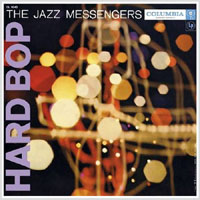The Jazz Messengers • Hard Bop Columbia/Impex Records IMP6016
Throughout the proceedings, the spotlight goes to altoist Jackie McLean, who went on to become an important player and major star for Blue Note. Sorely underrated trumpeter Bill Hardman, an especially "hard" hard-bop player with great technique and crisp articulation, went on to achieve some notoriety playing with the likes of Lou Donaldson, Curtis Fuller, Mal Maldron, Charles Mingus and Benny Golson. Nineteen-year-old bassist Jimmy "Spanky" de Brest and pianist Sam Dockery, though not achieving much commercial recognition at the time of this recording, were highly regarded by their peers. Bill Hardman’s "Cranky Spanky" starts things off with a hard-swinging, aggressive tune showcasing fine solos by McLean and the other sidemen. In particular, Hardman demonstrates his affinity for Clifford Brown-like lines and sound. This is a classic hard-bop anthem, clearly expressing the unique characteristics of the style: often minor-key, up-tempo compositions; a front line of two or more horns usually playing in unison; a joyous spirit to the music; and an attempt to "move" the listener -- literally. The standard "Stella By Starlight" is my favorite cut on the album, with the horns stating the theme emphatically in unison, McLean shining with his emotional, full-sounding alto sax solo, Hardman throwing caution to the wind and turning in a lovely solo, and Dockery following suit with an understated but rocking chorus. Another standard, "My Heart Stood Still," features McLean in a fiery solo, his best of the album -- compact with no wasted notes, aggressive and muscular. Based on his performance here, it’s no wonder he went on to become a major player. Hardman and Dockery do not disappoint either, Dockery especially turning in a particularly nice solo. Blakey’s drums are well captured on this cut, and you can easily hear the natural reverb of the 30th Street studio. Side two offers two originals, neither of which matches the exuberance heard on the first side. McLean’s "Little Melonae" is disjointed and angular, the spirit of hard bop sacrificed to aimless noodling. "Stanley’s Stiff Chickens" (what a title!) is a rather pedestrian treatment of a simple melody performed in a classic four-to-the-bar style with solos all around. It’s a pleasant enough ride but lacks the excitement that came to characterize hard bop and holds no surprises. Impex Records, a reincarnation of the well-respected Cisco Music label, has brought
this mono recording out of the vaults in a limited edition of 2500 180-gram vinyl copies
using ". . .first-generation original master tapes without computer processing of any
kind." Mastering guru Kevin Gray along with Robert Pincus cut this LP with minimum
EQ, unveiling the sound of the 30th Street studio and capturing all the nuance of the
session. The timbre of brass horns, taut drum skins, plucked strings and felt hammers is
well preserved. I do not have an original on hand, but I would be surprised if it sounded
any better than this. The RTI pressing is as quiet as the proverbial church mouse and the
packaging is beautiful -- from the tip-on jacket to the Rudy De Harak cover photo and
facsimile six-eye label. |

